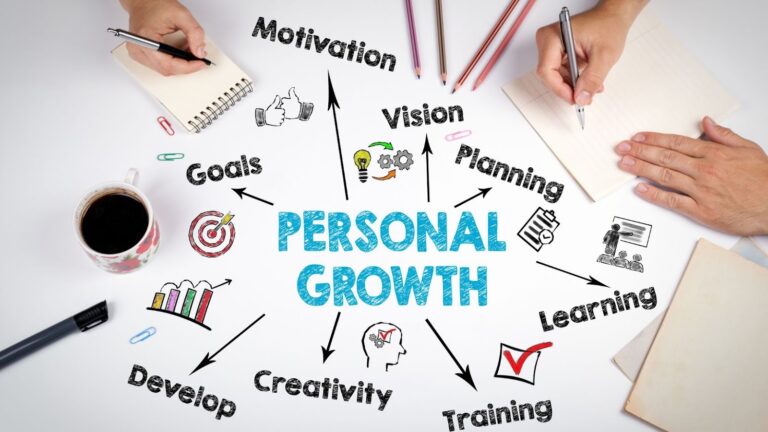
Importance Of Personal Development and Growth: Unlock Your Potential and Achieve Success
Personal development and growth have become essential in today’s fast-paced world. Individuals strive to unlock their full potential, seeking ways to enhance skills, boost confidence, and achieve personal goals. By focusing on self-improvement, people can navigate challenges more effectively and lead fulfilling lives.
Embracing personal growth involves continuous learning and self-reflection. Whether through setting clear objectives, adopting positive habits, or seeking new experiences, the journey of self-development empowers individuals to transform their lives. Understanding the importance of growth not only benefits personal well-being but also enriches relationships and career success.
Importance Of Personal Development
Personal development fosters self-awareness, enabling individuals to identify their strengths, weaknesses, and core values. This understanding enhances self-confidence, allowing them to pursue objectives with greater assurance. Improved communication skills and empathy, developed through personal growth, strengthen relationships both personally and professionally.
Investing in personal development increases employability by equipping individuals with essential skills and adaptability. Continuous learning leads to career advancement, as professionals stay relevant in evolving industries. Clear goal setting and the cultivation of positive habits ensure consistent progress and achievement.
Moreover, personal development supports mental and emotional well-being. Engaging in self-reflection promotes resilience, helping individuals navigate life’s challenges effectively. Seeking new experiences broadens perspectives, contributing to overall life satisfaction. By prioritizing personal growth, individuals achieve a balanced and fulfilling life.
Key Benefits of Personal Development
- Enhanced Self-Awareness: Understand personal strengths and areas for improvement.
- Increased Confidence: Pursue goals with assurance and determination.
- Better Relationships: Improve communication and empathy skills.
- Career Advancement: Gain relevant skills and adaptability for professional growth.
- Mental Well-Being: Develop resilience and effective coping strategies.
- Life Satisfaction: Achieve a balanced and fulfilling personal and professional life.
Personal Development in the Workplace
Organizations that encourage personal development observe higher employee satisfaction and retention rates. Professional growth opportunities lead to increased productivity and innovation. Employees engaged in personal development are more likely to contribute positively to team dynamics and organizational success.
| Aspect | Impact |
|---|---|
| Self-Awareness | Identifies strengths and areas for growth |
| Confidence | Enhances decision-making and leadership skills |
| Career Progression | Facilitates promotions and skill acquisition |
| Relationship Quality | Strengthens personal and professional bonds |
| Mental Resilience | Improves ability to handle stress and change |
| Overall Well-Being | Increases life satisfaction and happiness |
Summary
 Personal development plays a crucial role in individual growth, enhancing self-awareness, confidence, and relationships. It drives career advancement, supports mental well-being, and contributes to overall life satisfaction. By prioritizing personal growth, individuals achieve a balanced and successful life.
Personal development plays a crucial role in individual growth, enhancing self-awareness, confidence, and relationships. It drives career advancement, supports mental well-being, and contributes to overall life satisfaction. By prioritizing personal growth, individuals achieve a balanced and successful life.
Key Areas Of Personal Growth
Personal growth encompasses various essential areas that contribute to an individual’s overall development. Focusing on these key areas enhances self-awareness, effectiveness, and fulfillment.
Emotional Intelligence
Emotional intelligence (EI) plays a crucial role in personal growth by enabling individuals to understand and manage their emotions effectively. High EI contributes to:
- Self-Awareness: Recognizing personal emotions and their impact on thoughts and behavior.
- Self-Regulation: Controlling impulsive feelings and adapting to changing circumstances.
- Motivation: Maintaining a strong drive to achieve goals despite challenges.
- Empathy: Understanding and considering the emotions of others, fostering stronger relationships.
- Social Skills: Navigating social complexities and building effective communication.
Developing emotional intelligence enhances interpersonal interactions, increases resilience, and supports mental well-being.
Goal Setting
Goal setting is a fundamental component of personal growth that provides direction and purpose. Effective goal setting involves:
- Specificity: Defining clear and precise objectives to focus efforts.
- Measurability: Establishing criteria to track progress and assess achievement.
- Achievability: Setting realistic goals that are attainable with available resources.
- Relevance: Ensuring goals align with personal values and long-term aspirations.
- Time-Bound: Assigning deadlines to create urgency and commitment.
Implementing SMART (Specific, Measurable, Achievable, Relevant, Time-Bound) goals increases the likelihood of success, enhances motivation, and fosters a sense of accomplishment.
Strategies For Personal Development
Implementing effective strategies fosters continuous improvement and enhances overall well-being. These approaches support individuals in achieving their personal and professional goals.
Continuous Learning
Continuous learning keeps individuals adaptable and competitive in evolving environments. Engaging in activities like online courses, workshops, and reading industry-specific books builds new skills and expands knowledge. For example, completing a certification program can improve career prospects and personal expertise.
Time Management
Effective time management maximizes productivity and reduces stress. Utilizing tools such as calendars, to-do lists, and time-tracking apps helps prioritize tasks and allocate appropriate time slots. The Pomodoro Technique, which involves working in 25-minute intervals with short breaks, enhances focus and task completion rates.
Tools And Resources
Effective personal development relies on utilizing the right tools and resources. These resources provide structured guidance and support continuous growth.
Books And Courses
Books and courses offer structured knowledge and practical strategies for personal growth. Popular books include:
- “Atomic Habits” by James Clear: Focuses on building and sustaining good habits.
- “The Power of Now” by Eckhart Tolle: Emphasizes mindfulness and living in the present.
- “Mindset” by Carol S. Dweck: Explores the benefits of a growth mindset.
Courses enhance skills through interactive learning:
- Coursera’s Personal Development Courses: Cover goal setting, time management, and emotional intelligence.
- Udemy’s Self-Improvement Classes: Provide modules on productivity, leadership, and communication.
- LinkedIn Learning’s Professional Development Paths: Offer comprehensive programs for career advancement.
Online Communities
Online communities facilitate connection and support among individuals pursuing personal growth. Notable communities include:
- Reddit’s r/selfimprovement: Shares tips, resources, and experiences on personal development.
- Mind Tools Community: Provides forums for discussing skill enhancement and career growth.
- GrowthHackers: Focuses on strategies for continuous improvement and professional success.
These platforms enable knowledge sharing, accountability, and motivation, essential for sustained personal growth.
Measuring Personal Growth
 Assessing personal growth involves multiple strategies that provide clear indicators of progress. By implementing these methods, individuals can effectively monitor their development.
Assessing personal growth involves multiple strategies that provide clear indicators of progress. By implementing these methods, individuals can effectively monitor their development.
Setting SMART Goals
Establishing SMART (Specific, Measurable, Achievable, Relevant, Time-Bound) goals creates a structured framework for growth. Specific goals define precise outcomes, while measurable criteria track progress. Achievable goals ensure realistic targets, relevant goals align with personal values, and time-bound goals set deadlines for achievement.
Tracking Progress
Consistently tracking progress highlights advancements and areas needing improvement. Tools such as journals, digital apps, and spreadsheets record daily activities and milestones. Regular reviews enable individuals to adjust strategies and maintain momentum toward their objectives.
Self-Reflection
Engaging in self-reflection enhances self-awareness and identifies personal strengths and weaknesses. Practices like journaling, meditation, and periodic self-assessments allow individuals to evaluate their actions, decisions, and overall growth. This introspection fosters continuous improvement and personal accountability.
Feedback from Others
Receiving feedback from peers, mentors, and supervisors provides external perspectives on personal development. Constructive feedback highlights blind spots and reinforces strengths. Regular feedback sessions facilitate open communication and support sustained growth efforts.
Using Metrics and Indicators
Employing quantitative and qualitative metrics offers objective measures of personal growth. Key Performance Indicators (KPIs) such as skill acquisition rates, goal completion percentages, and time management efficiency quantify progress. Additionally, qualitative indicators like increased confidence, improved relationships, and enhanced problem-solving abilities provide a comprehensive view of development.
| Measurement Method | Description | Tools/Examples |
|---|---|---|
| SMART Goals | Specific, Measurable, Achievable, Relevant, Time-Bound | Goal-setting templates, apps |
| Tracking Progress | Monitoring advancements and milestones | Journals, digital trackers, spreadsheets |
| Self-Reflection | Evaluating personal actions and growth | Journaling, meditation, self-assessments |
| Feedback from Others | External perspectives on development | Peer reviews, mentorship sessions |
| Metrics and Indicators | Quantitative and qualitative measures of growth | KPIs, surveys, performance reviews |
Implementing these measurement techniques ensures a comprehensive evaluation of personal growth, enabling individuals to achieve their development goals effectively.
Common Challenges And Solutions
Lack of Motivation
Maintaining motivation poses a significant barrier to personal development. When enthusiasm wanes, setting smaller, achievable goals and celebrating incremental successes can reignite drive. Additionally, connecting tasks to long-term objectives reinforces purpose and commitment.
Time Management
Effective time management often challenges individuals striving for growth. Implementing techniques like the Pomodoro Technique and prioritizing tasks using the Eisenhower Matrix enhances productivity. Utilizing digital calendars and to-do lists ensures structured scheduling and reduces procrastination.
Fear of Failure
Fear of failure hinders progress by preventing risk-taking and experimentation. Adopting a growth mindset shifts focus from avoiding mistakes to learning from them. Embracing setbacks as opportunities for improvement fosters resilience and encourages continual advancement.
Procrastination
Procrastination delays personal development efforts. Breaking tasks into smaller steps and setting clear deadlines mitigates this issue. Additionally, creating a distraction-free environment and leveraging accountability partners increases task completion rates.
Limited Self-Awareness
A lack of self-awareness restricts understanding of strengths and weaknesses. Engaging in regular self-reflection and seeking feedback from peers enhances self-understanding. Tools like personality assessments and journaling facilitate deeper insights into personal behaviors and preferences.
Inconsistent Goal Setting
Inconsistent goal setting disrupts the path to personal growth. Establishing SMART goals provides clarity and direction. Regularly reviewing and adjusting objectives ensures alignment with evolving aspirations and maintains momentum.
Resource Constraints
Limited access to resources impedes personal development initiatives. Leveraging free or low-cost resources, such as online courses and community workshops, overcomes financial barriers. Networking with like-minded individuals also provides support and shared opportunities for growth.
Information Overload
Excessive information can overwhelm individuals pursuing personal development. Curating reliable sources and focusing on relevant content streamlines learning processes. Setting specific learning objectives helps filter information and maintain focus on essential topics.
Maintaining Consistency
Sustaining consistent efforts is crucial for continuous growth. Establishing daily routines and integrating personal development activities into regular schedules fosters habitual progress. Tracking achievements and setting periodic reviews maintain accountability and persistence.
Balancing Multiple Responsibilities
Balancing personal development with existing responsibilities presents a challenge. Prioritizing tasks and allocating dedicated time slots for growth activities ensures that personal advancement remains a priority. Delegating non-essential tasks and optimizing daily schedules support effective balance.
Lack of Support
A lack of support systems can isolate individuals on their personal development journey. Building a network of supportive peers and mentors provides guidance and encouragement. Engaging in communities, both online and offline, facilitates shared learning and mutual motivation.
Overcoming Negative Self-Talk
Negative self-talk undermines confidence and growth efforts. Practicing positive affirmations and cognitive restructuring shifts internal dialogue towards empowerment. Seeking professional help, such as coaching or therapy, further assists in transforming self-perceptions.
Maintaining Motivation Over Time
Sustaining long-term motivation requires ongoing strategies. Setting progressive milestones and varying personal development activities prevent monotony. Regularly revisiting and redefining goals keeps the pursuit of growth dynamic and engaging.
Dealing with Setbacks
Encountering setbacks can derail personal development plans. Developing coping strategies, such as mindfulness and stress management techniques, maintains focus during challenging times. Viewing setbacks as learning experiences promotes adaptability and perseverance.
Lack of Clear Direction
Unclear direction impedes effective personal growth. Conducting self-assessments and defining core values provide a foundation for goal setting. Establishing a clear vision aligns actions with desired outcomes and enhances purposeful advancement.
Inadequate Feedback
Insufficient feedback limits the ability to gauge progress. Actively seeking constructive criticism from trusted sources offers valuable insights. Implementing feedback into personal development plans ensures continuous improvement and accountability.
Summary of Challenges and Solutions
| Challenge | Solution |
|---|---|
| Lack of Motivation | Set achievable goals, celebrate small successes |
| Time Management | Use Pomodoro Technique, prioritize with Eisenhower Matrix |
| Fear of Failure | Adopt a growth mindset, view setbacks as learning opportunities |
| Procrastination | Break tasks into steps, set deadlines, minimize distractions |
| Limited Self-Awareness | Engage in self-reflection, seek peer feedback |
| Inconsistent Goal Setting | Establish SMART goals, regularly review and adjust objectives |
| Resource Constraints | Utilize free resources, network with supportive individuals |
| Information Overload | Curate reliable sources, set specific learning objectives |
| Maintaining Consistency | Create daily routines, track achievements |
| Balancing Multiple Responsibilities | Prioritize tasks, allocate dedicated time for growth |
| Lack of Support | Build a support network, engage in communities |
| Overcoming Negative Self-Talk | Practice positive affirmations, seek professional help |
| Maintaining Motivation Over Time | Set progressive milestones, diversify activities |
| Dealing with Setbacks | Develop coping strategies, view setbacks as learning experiences |
| Lack of Clear Direction | Define core values, establish a clear vision |
| Inadequate Feedback | Seek constructive criticism, implement feedback |
Embracing Growth for Personal Development
Personal development is a continuous journey that transforms lives. By embracing growth, individuals unlock their potential and navigate challenges with resilience. The commitment to learning and self-improvement fosters stronger relationships and paves the way for career success.
Organizations benefit too as they cultivate environments that support personal growth, leading to more engaged and innovative teams. Investing in oneself not only enhances personal well-being but also contributes to a more balanced and fulfilling life.
Ultimately personal development empowers individuals to achieve their goals and live authentically. It’s a vital pursuit that enriches every aspect of life, ensuring sustained progress and lasting satisfaction.







